February 18th, 2004
On February 2nd I boarded a plane and travelled to brightest Australia. It’s summer there, hot and humid in stark contrast to Oregon, which is cold and humid. I met people, animals, and rocks; I lectured and toured. All in all, it was a nice trip, but too long. I missed my home, wife, and animals. Herewith some vignettes from the trip:
On Friday morning I delivered a keynote lecture at a conference held at the Sydney Opera House:
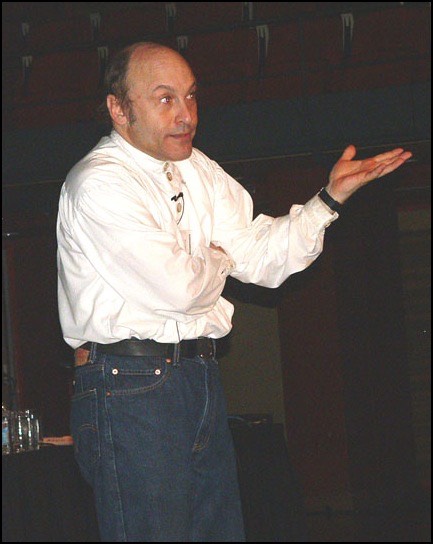
It was my typical line about interactivity. Nothing special.
Also keynoting the conference was David S. Freeman, who spoke Friday afternoon. Seldom have I had such a strong negative reaction to an individual. It began when the fellow introduced himself at great length, explaining the many grand and glorious achievements of his career. He told us (and his brochure repeats it) that he offers "the most popular screenwriting and fiction workshop". It took him at least five minutes to regale us with his triumphs. Then he went to work presenting us with his ideas.
Perhaps "idea" is too strong a term. As his brochure puts it, he offers "no abstract theory -- just 200 proven techniques". It’s a hodgepodge, a humongous heap of tips & tricks, hortations with no underlying concepts. He does, however, dress up his non-concepts in grand terminology. He calls his bag of tricks "Emotioneering" a term that he has trademarked.
Mr. Freeman has grouped his tips & tricks into categories. Category #22, for example, is "Revealing complex characters through their actions". Gee, and I thought that was Aristotle’s idea... I can’t refrain from the catty observation that he doesn’t know the difference between a "principal" and a "principle". And then there’s this train wreck of a definition:
"Definition: Rooting Interest Techniques are techniques which make us ’root for’ - or, more precisely, identify with (empathize with) a character. The term sounds like it means we cheer the character on who has Rooting Interest. We do, but that’s just a byproduct our identifying with him or her. Thus, a character with Rooting Interest is one with whom we empathize..."
What really set me off (and induced me to walk out of his lecture) was the man’s spectacularly silly discussion of a bit of artwork he had used for the cover of his new book (which he told us about several times). This artwork depicted a large muscular gentleman with the requisite cliched crew cut and square jaw shoving a ridiculously large handgun into the face of a ridiculously ugly green monster as he hoists a beauty upwards with his other hand. Meanwhile, more dastardly-looking monsters approach, asnarl and aslobber:
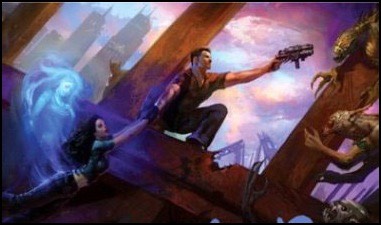
This comic-book drawing provided the basis for ten minutes of lecture on its deeper dramatic significance. We were told, for example, of the complex emotional conflicts torturing our oh-so-sensitive hero as he contemplates the risks he takes by using but a single hand to wield his blaster. If he were to dump the curvaceous beauty, he could use both hands, the better to blast the beasts with, but after long milliseconds of agonized soul-searching he has decided to risk all for virtue. Even worse, we are told, the slimy green monster he is about to vaporize is actually his boyhood friend and best buddy, who has been transformed into a monster. Oh, the exquisite agony our hero must endure as he stares into the vacant slit eyes of the lizard-creature who was once his bosom buddy! What paroxisms of dramatic sturm und drang this stupendous turn of events unleashes upon our tortured souls! And then, to heap catastrophe upon disaster, we learn that the helpless maid our hero so nobly saves is none other than the ignorant fool whose errors led to this tragic turn of Fate! Yet despite this titanic crush of events, our hero maintains his steadfast commitment to Rightness and Truth, determined to save the maiden even as he dispatches his buddy to hell. What a pinnacle of dramatic power David S. Freeman has forged!
That’s when I walked out of his lecture. As the door closed behind me, I heard him telling his listeners how he had led the way in introducing true drama to the games industry.
At a party a few nights later, I had an interesting conversation ¸with a chap straight out of the "critical theory" school. This guy is just wrapping up his PhD and presented me with his objections to my lecture on interactivity. At first I was tempted to dismiss his claims as idle academic bullshit, but I decided to hear the man out and see if I couldn’t accomplish something by poking at him.
His commentary was hopelessly enmeshed in polysylllabic vocabulary; I very much doubt the man could say anything simply and clearly. Again, I held my tongue and let him spray his obfuscatory terminology all over my face. His primary problem, it appears, lay with the conversational metaphor I use; he rejected that metaphor out of hand. He considered it not merely misleading but downright wrong. I tried to pin him down on the question of what constitutes an "incorrect" metaphor, but he could not be bothered with notions of intellectual utility. He instead proffered his own metaphor, which revolved around "evocation, invocation, and avocation". As best I can determine, this refers to the notion that one "invokes" the power of the computer, which causes it to "evoke" some action; if that action distracts you from your original intention, then it "avokes" you.
Now, there actually is a useful idea here, that there is an asymmetry in the volition of the two agents. The user has all the volition and the computer has none. The conversational metaphor does not recognize this asymmetry; my interlocutor considered this deficiency fatal. I made much of it, for his benefit, but I do not see any practical implications for the distinction he makes so much of.
Indeed, it took much exploration on my part to determine his intellectual objectives. I repeatedly referred to the intellectual utility of the conversational metaphor, and that reference made no dent on him; he was unconcerned with such considerations. After much discussion, I was able to establish that his interest lay in coming up with an interpretation of computing that fit his world view. I did not bother making the futile suggestion that perhaps the problem lay in his world view. Instead, I suggested that his efforts were akin to translating a book from one language to another, the second language being critical language. My contempt for such self-centered distortions of reality I kept close to my vest. He was quite pleased with my analogy.
The poor fellow just couldn’t get over his preconceptions. He kept referring to his "invocation, evocation, avocation" metaphor as "better" than the conversational metaphor, even after I had asked him what constituted a "better" metaphor, and he had failed to accept "utility" as the answer. I ended up merely raising an eyebrow and repeating "better?" whenever he slipped and made the reference.
I am glad that I took the time to hear the man out. These critical theory people really are floating off in their own pointless intellectual bubble, but I needed to take the time to confirm it.
Deeply troubled by these experiences, I went to the zoo on Sunday and meditated with a koala:
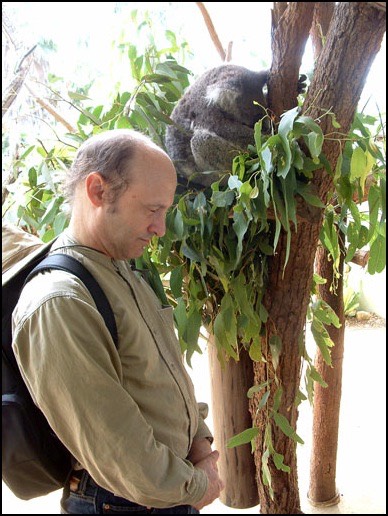
His wisdom rejuvenated me and prepared me for new travails.
On Monday, I began teaching at the XMediaLab workshop on interactivity:
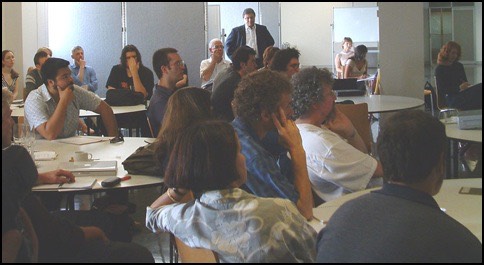
The attendees were mostly film people wanting to break into interactive stuff. They were obviously talented and energetic, and I was impressed that they did not flinch when I told them that they’d have to learn a little mathematics in order to design algorithms. There was one problem with the three-day course. I was scheduled to lecture for 90 minutes each day, and I had prepared rough sketches for each of the three lectures. On the first day the organizer, Brendan Harkin, notified me just before the lecture that he needed to cut about 30 minutes out of my lecture. Being a pro, I readily agreed. On the second day, Brendan again made the same request, and again I relented, although I warned him that my lecture on Wednesday required the full 90 minutes. On Wednesday, he repeated his request; he had brought in two unscheduled speakers and need to cut into my lecture by about 30 minutes. I told him that I really needed the time, but would go along with whatever he required. He promised he’d keep the intrusion as short as possible. When my time came, I had exactly 30 minutes to present my material. I noted that Brendan had reduced my speaking slot from 90 minutes to 30 minutes, and warned the class that things would be a little compressed (this, I fear, earned me Brendan’s anger). Then I raced through the material, making each main point and offering a brief expansion on it -- without any examples or justifications.
On Thursday I spent some time with a government official wanting my advice on how to advance the games industry in Sydney. He took a picture for me:
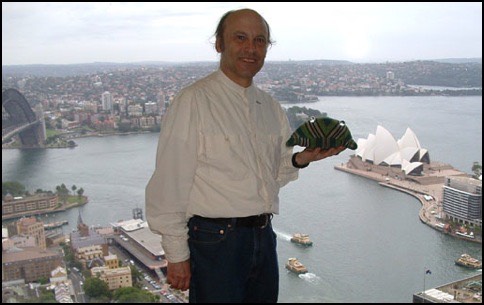
That afternoon I went to Watson’s Bay via the ferry; it was OK but not particularly interesting. Perhaps the best part of it was the opportunity to take a good photo:
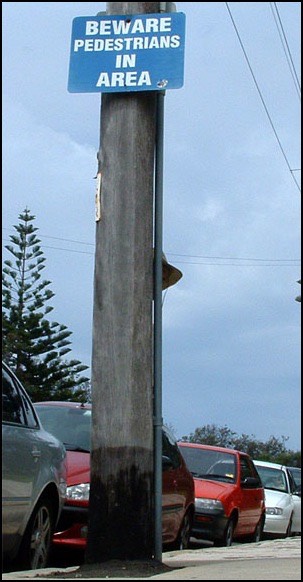
Suspicious-looking pedestrian hiding behind pole.
Friday morning I was scheduled to give the keynote address at the IE2004 conference at 9:00 AM. I had intended to take the train, leaving at about 8:00 AM, but Brendan Harkin insisted on picking me up and taking me there. Moreover, he wanted to pick me up at 8:30 AM, which I thought was cutting it close, but he was confident, so I acquiesced. But at 8:30 Brendan was nowhere to be seen. I paced back and forth in front of the hotel, but still no Brendan. At 8:42 I bailed out and grabbed a cab; I walked into the lecture room at 8:59, thoroughly agitated.
The lecture itself went well, but a new problem arose. Brendan had promised to meet me at IE2004 to make a second payment for my time and to obtain the bank information he needed to transfer reimbursement for my air fare. But although I was there all day, I never saw Brendan (although I am told that he did make an appearance).
So on Friday evening I boarded the train for Katoomba in the Blue Mountains. This was to be my vacation, my reward for all the hassles and tedium of the trip. I had booked a hotel room through an agent. I had told her that I wanted a mid-range hotel. Upon arrival, this is the hotel I found myself booked into:
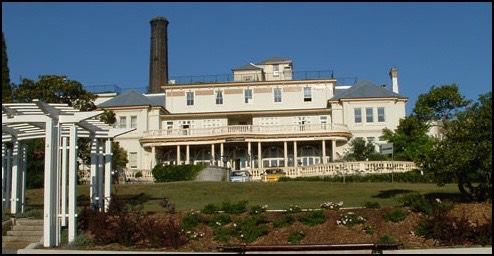
OK, so I got taken by a travel agent attempting to maximize her income. I shrugged my shoulders and sighed philosophically. The hotel was nice.
The main purpose of my trip to the Blue Mountains was to see the stars. As evening fell a fog rolled in. I went for a walk, looking for dinner and found a chinese restaurant. I was the only customer; never a good sign. But the food was masticatable.
Still the fog remained. I went back to the hotel and read for a few hours. Still fog. I went to bed but woke up several times to check the sky; nothing each time. In the morning, there was brilliant blue sky promising a hot and sunny day. Typical.
So I checked out of the hotel and walked down to Echo Point. My secondary objective for the trip was to collect some old rocks. I went into the information store and purchased a topo map and a geological map for a total of $25. They gave me good information. So I started my hike.
Unfortunately, after about a mile I came to a sign that said that the trail down to the lower levels, where the good rocks were, was closed. Another sign threatened a fine of $500 for anyone caught off the trails. They had pretty well blocked off all access to the rocks I wanted to reach. After another two hours of hiking about, trying to find a way down, I gave up. I did, at least, get a good photo:
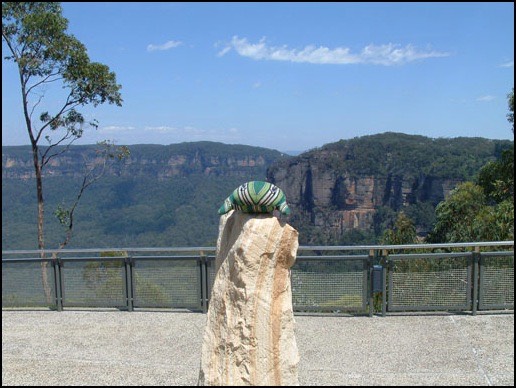
So I hiked back up to town, and finally my luck broke: I found a used bookstore. "Bookstore" isn’t quite the right term to use here. The place was really a mammoth garage sale in a shop crammed with all manner of odd stuff. Old typewriters, books, crystal, clothing, kitchen appliances, pins, buttons -- a riot of old stuff. In many cases I couldn’t get a good look at the books because they were stacked behind piles of old furniture. I spent a good hour at that store, purchased a few titles, then wandered up the street a ways further -- where I found another used bookshop! I was feeling so sorry for myself after the failures of the last 24 hours that I indulged in a few more books. There was a third bookshop even further, but I was gorged on books and didn’t indulge myself.
Late that afternoon I took the train back to Sydney. There I found another surprise waiting for me: the reservations at the hotel where I was staying had ended that morning. My room had been given to somebody else and they had no room for me. Now, Brendan Harkin had known my travel plans and had arranged everything; how could he have made such an oversight? There was nothing to be done but ¸to find another hotel. The Holiday Inn staff were happy to find me a new hotel, and when I mentioned that I was happy to stay at the airport (thinking it might be cheaper than staying in the city), they suggested the Holiday Inn at the airport. There was one small matter: the room rate was $300 per night. I was stunned; even the swanky hotel in Katoomba had wanted only $145. I asked if there were anything cheaper they might suggest but they warned that most hotels would already be full by this time.
Moreover, the hotel was far from the train station, so I’d best take a taxi, at $25. On the way to the Holiday Inn, we passed a hotel just two blocks from the Holiday Inn that advertised a room rate of $104. At the reception desk I asked if their room rate was typical. No, this is a 4-star hotel, the receptionist told me. In that case, I replied, I’ll just walk the two blocks to the cheap hotel. But she warned me that they were probably full and that if I didn’t take the room I had with them, it might not be available if I came back. I decided not to call her bluff, and took the room.
The room itself was big, but the air conditioning couldn’t keep up with the Australian heat. I couldn’t get to sleep until about 1:00 AM. So much for 4-star hotels.
On Sunday I flew to Melbourne, and on Monday morning at 3:30 AM I finally got a chance to see the southern sky. It wasn’t a good view: I was in a park in downtown Melbourne across the street from my hotel. The park was only one square block, and was full of streetlights, so I could only see down to about second magnitude. It was interesting trying to get my bearings. I immediately identified Jupiter and from there found Spica, which led me to Scorpio and Libra -- but Scorpio was upside down, a most disconcerting sight. From there I had problems. I was able to recognize the Southern Cross, but the charts in my Palm Pilot were of no use. I saw alpha Centauri, of course, and a few other things more northerly, but that was it. Oh well.
I have always maintained a strong sense of direction; unconsciously taking my cues from sun and stars, my internal compass has always infallibly kept me firmly oriented. Yet here in the southern hemisphere the sun arcs northward rather than southward. This simple reversal should be easily corrected but the instinctive nature of my compass does not readily respond to such conscious corrections. The high altitude of the sun at this low latitude added to my confusion; azimuth is necessarily less determinate at high altitudes. My confusion was exacerbated by all the confusions of the city: the high buildings blocking the sun, the clouds, and the general noise level.
Yes, the noise was another disorienting factor. Back home the acoustic environment is natural: birds, wind sounds, and the occasional barking dog. But in both Sydney and Melbourne I was assailed with strong low-frequency background noise. It may have been the trolleys or the trains; I don’t know the true source. But the deep rumbles were frequent and loud. At one point I found it so disturbing that I asked my hosts if they heard it. They paused for a second to listen, and then confirmed the sounds but averred that they had become so accustomed to these rumbles that they seldom noticed them. I supposed that the singing of the crickets at my place would keep them awake all night.
On Monday I lectured at the University of Melbourne. It went well. I spent some time talking with people there, then went to the Australian Center for the Moving Image, also known as ACMI. That evening I had dinner with some Australian game developers.
The weather in Melbourne was nicer than in Sydney. It’s a bit cooler and, more important, much less humid. The landscape reflects it; the ground is as dry as California. Indeed, the floral biodiversity here seems even less than California’s. The only trees are the standard eucalyptus, and most of these seem to grow in reservation-forests. The open ground has some scattered trees in places, but most of the trees are concentrated in obvious reserves with sharp, geometric boundaries. These artificial forests are composed of just two segregated species. The first is a dull green grey, while the second is a darker forest green.
The landscape around Sydney reflects the higher humidity (and, presumably, more frequent rains). It’s not the dry brown of California and Melbourne; it’s green. Not lush, lavish green, nor even a solid green, but it’s definitely a well-watered green, not a dry brown. These people may talk about a drought but it is only relative to their expectations.
When the plane from Melbourne arrived in Sydney, there was a long wait to get off the plane -- I was in the back. I saw a baggage cart driver roll up and carry out a clumsy serpentine maneuver. Then he unhitched the last cart in his train and I realized his purpose: the last cart contained a dog in a cage, and he was leaving the dog in the shadow of the wing rather than out in the sun. I was struck by the professionalism of the baggage cart driver. I also realized how much I missed my own dogs Auggie and Moose.
